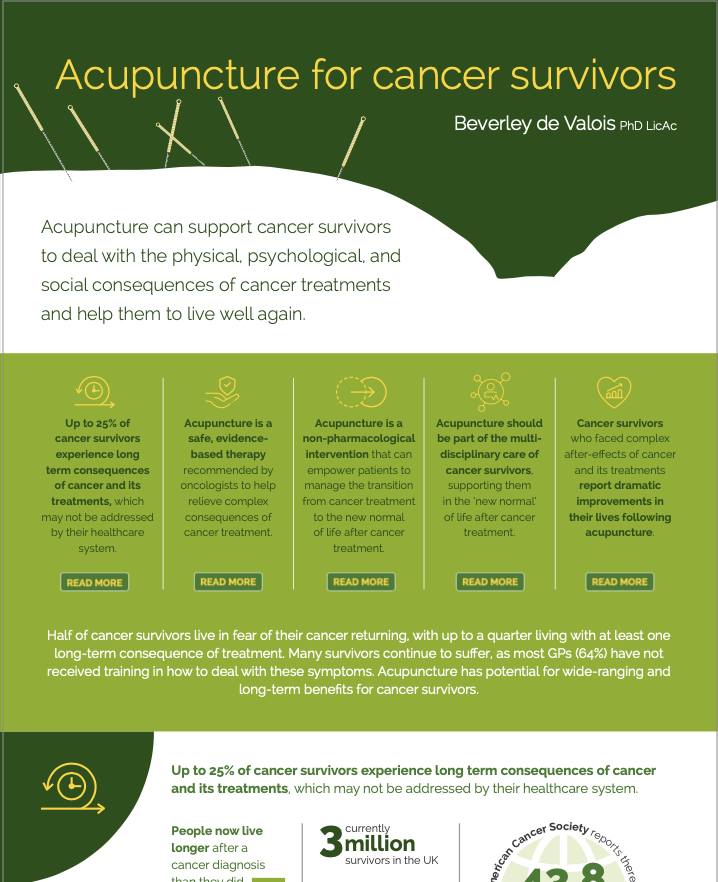
How I can help you:
- My clinic(s) are for people who have completed “active” cancer treatments, that is:
- surgery
- chemotherapy and/or
- radiotherapy
no matter how recently or how long ago.
- They may still be on long-term therapies, such as hormonal therapies or immunotherapy
- I work to support people post-cancer treatment, using acupuncture to manage the late and long-term effects of cancer treatment
This helps people to adjust to the “new normal” of life after cancer treatment - Enabling coping and improving resilience are key goals of my approach
- Overall, I work to facilitate recovery, renewal and transformation after cancer treatment – many people say, “Acupuncture has given me my life back”.
What I can help you with:
Many medical guidelines recommend acupuncture as a treatment option for pain and other cancer treatment related conditions. https://integrativeonc.org/practice-guidelines-2
Clinically, acupuncture is used to manage many other symptoms experienced by cancer survivors, including anxiety, depression, and sleep problems.
As a researcher, I have studied many of the troublesome consequences of treatment. My studies include investigating acupuncture to:
- Manage hot flushes and night sweats experienced by breast cancer survivors
- Improve wellbeing and quality of life for people with upper body cancer treatment-related lymphoedema
- Improve wellbeing for prostate cancer survivors.
I have also worked extensively with colorectal cancer survivors in an NHS hospital outpatient department.
I have explored the evidence base for other consequences of cancer and its treatments including:
- Cancer treatment-related fatigue
- Cancer treatment-related pain (including aromatase inhibitor associated musculoskeletal pain syndrome and post-treatment pain)
- Radiotherapy induced xerostomia (dry mouth).

Why choose me?
I am one of the West’s foremost authorities on using acupuncture to help people recover after cancer treatment.
I have nearly 25 years experience as a researcher and practitioner in the NHS and private sector.
I aim to improve overall quality of life as well as relieve symptoms, helping people to thrive, not merely survive.
Questions and Answers
What is the youngest age that you treat?
The Cancer Survivorship Clinics are for adults, age 18 and over.
I’ve had so many needles during my cancer treatment, I am not sure I can cope with more needles! How will you deal with this?
Many cancer survivors have said this and have gone on to really enjoy having acupuncture. I use very gentle needling techniques, and work with my patients to ensure they feel comfortable. If patients find needles really are unacceptable, I draw on other techniques that don’t use needles.
How often will I need to come and how many sessions will I need?
This depends on many factors and there is no overall rule. For most conditions, a series of weekly treatments is advisable at the start. As health improves and symptoms diminish, appointments become less frequent. I review progress at each session, and work with each person to find the optimum frequency and number of treatments needed for their condition and aims.
Can I have treatment at the Cancer Survivorship Clinics if I am still undergoing chemotherapy and/or radiotherapy?
Acupuncture can be very helpful in supporting people as they undergo cancer treatments. However, the Cancer Survivorship Clinics focus on helping people to recover after treatment has finished. If you wish to have acupuncture when you are undergoing active cancer treatment, check with your cancer treatment centre. Many cancer treatment centres offer acupuncture for their patients.
I have completed chemotherapy and/or radiotherapy and am taking hormonal treatments to reduce risk of cancer recurrence. I will be taking these for many years. Can I have treatment at the Cancer Survivorship Clinics?
Yes, Cancer Survivorship Clinics are appropriate for people who have completed cancer treatment and are taking medications long-term to manage cancer and/or reduce risk of cancer recurrence. Examples of such medications include:
- hormonal therapies used for breast and endometrial cancers such as tamoxifen, aromatase inhibitors, goserelin
- androgen deprivation therapies used for prostate cancer
- Herceptin used for management of breast cancer.
How can I find out more about acupuncture?
The British Acupuncture Council website has information about what acupuncture is, as well as frequently asked questions about acupuncture generally https://acupuncture.org.uk/ The National Cancer Institute publishes a comprehensive discussion about acupuncture and cancer on its website https://www.cancer.gov/about-cancer/treatment/cam/patient/acupuncture-pdq

